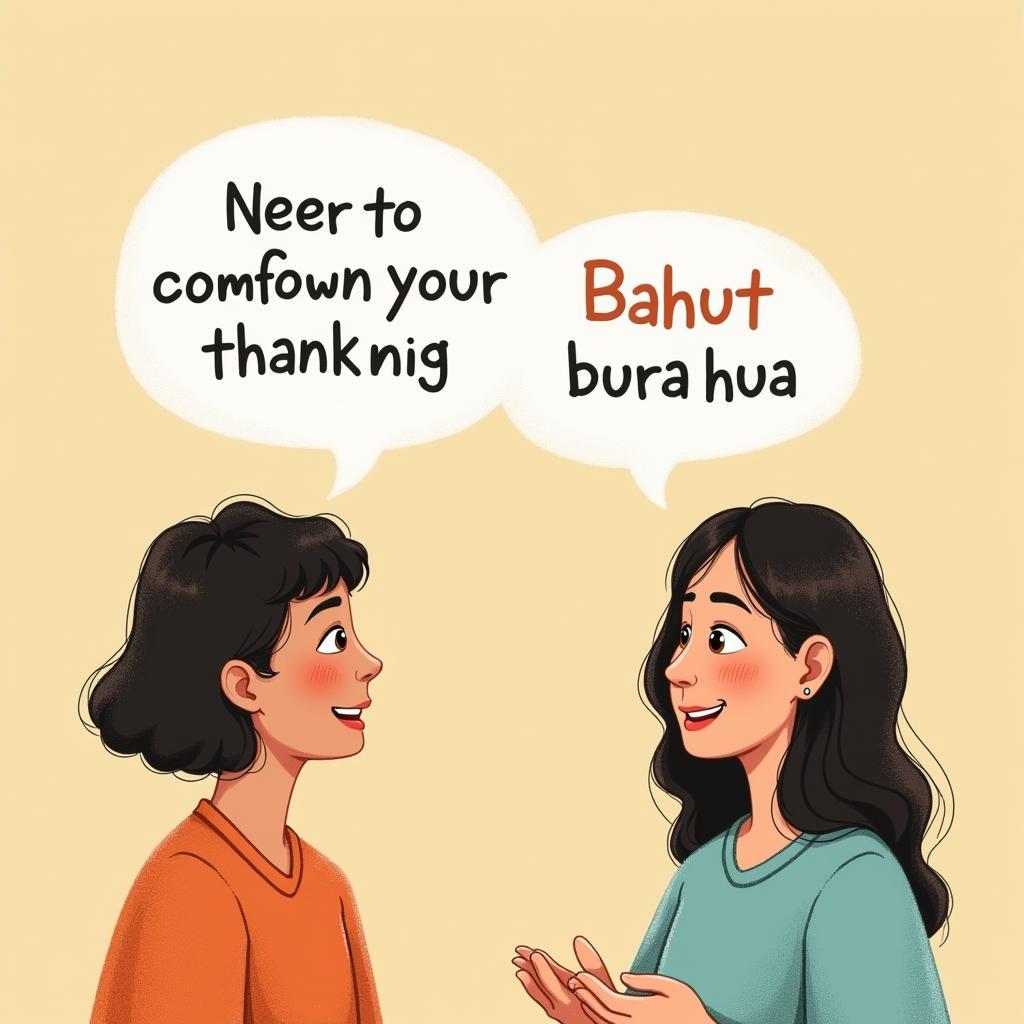“Bahut Bura Hua,” a Hindi phrase signifying “that’s very bad” or “I’m so sorry that happened,” encapsulates a profound sense of regret and empathy. This article delves into the nuances of this expression, exploring its cultural context and offering alternative ways to convey similar sentiments in English.
Exploring the Meaning of “Bahut Bura Hua”
“Bahut bura hua” goes beyond a simple apology. It acknowledges the gravity of a situation and expresses genuine concern for the person affected. It’s a phrase often used in situations involving loss, misfortune, or disappointment. The words carry a weight of shared sadness and a desire to offer comfort. While a direct translation might be “very bad happened,” its emotional resonance is much deeper.
Cultural Context of “Bahut Bura Hua”
In Hindi and related languages, “bahut bura hua” reflects a cultural emphasis on collectivism and shared experiences. It demonstrates an understanding of interconnectedness and the importance of offering support during challenging times. The phrase isn’t just a statement; it’s an act of emotional solidarity.
Alternative Expressions in English
While no single English phrase perfectly captures the depth of “bahut bura hua,” several options convey similar sentiments:
- “I’m so sorry to hear that.” This is a common and heartfelt expression of sympathy.
- “That’s terrible. I’m so sorry.” This emphasizes the seriousness of the situation.
- “My deepest condolences.” This is appropriate for expressing sympathy in the face of loss.
- “I can’t imagine how difficult this must be for you.” This acknowledges the other person’s pain.
- “Please know that I’m here for you.” This offers practical support and companionship.
Choosing the Right Words
The best expression to use depends on the specific context and your relationship with the person you’re addressing. Consider the severity of the situation and the level of formality required. For close friends or family, a more informal and personal expression might be appropriate, while a more formal expression might be better suited for professional or less personal relationships.
Responding to “Bahut Bura Hua”
If someone says “bahut bura hua” to you, a simple “thank you” or “I appreciate your concern” can suffice. You might also share your feelings or offer a brief explanation of the situation.
What does “bahut bura hua” mean literally?
“Bahut” means “very” and “bura” means “bad.” “Hua” is a form of the verb “hona,” which means “to happen” or “to be.” So, literally, it translates to “very bad happened.”
When is it appropriate to use “bahut bura hua”?
Use this phrase to express sympathy or regret for a negative event, such as a loss, accident, or failure.
Can I use “bahut bura hua” in a formal setting?
While the phrase itself isn’t inherently informal, the context matters. In a very formal setting, a more formal expression might be preferred.
 Responding with Gratitude and Understanding
Responding with Gratitude and Understanding
Conclusion: Expressing Empathy with “Bahut Bura Hua”
“Bahut bura hua” represents a powerful way to express empathy and support. Understanding its meaning and cultural context allows for more effective communication and strengthens interpersonal connections. Whether you use “bahut bura hua” itself or choose an appropriate English alternative, expressing genuine concern and offering comfort can make a significant difference in someone’s life. “Bahut bura hua” reminds us of the importance of shared humanity and the power of empathy in navigating difficult times.
FAQs about “Bahut Bura Hua” and Expressing Sympathy
- What are some other Hindi phrases that express sympathy?
- How can I offer support beyond words?
- Is it culturally appropriate to offer physical comfort, like a hug?
- What if I don’t know what to say?
- How can I be mindful of cultural differences when expressing sympathy?
- What are some common mistakes to avoid when offering condolences?
- How can I express sympathy in a written message?
For further exploration on the power of words and emotional expression, check out our other articles on ViperCircle related to empathy, communication, and cultural understanding.
When you need assistance, please contact us via Email: Contact@ViperCircle.com or visit us at G-5, लोअर परेल, सेनापति बापट मार्ग, मुंबई, महाराष्ट्र – 400013, भारत।. We have a 24/7 customer support team ready to help.